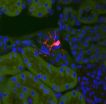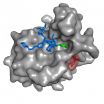Cover crops can sequester soil organic carbon
2014-12-02
(Press-News.org) URBANA, Ill. - A 12-year University of Illinois study shows that, although the use of cover crops does not improve crop yields, the practice does increase the amount of sequestered soil organic carbon using three different soil management systems.
U of I soil scientist Ken Olson evaluated plots that were subjected to no-till, chisel plow and moldboard plow treatments with and without hairy vetch and cereal rye cover crops.
"By 2012, we found that the soil tillage plots that had cover-crop treatments had more soil organic carbon stock than those without cover crops for the same soil root zone and tillage treatment," Olson said.
In fact, Olson said that the no-till system, with cover crops, sequestered the most soil organic carbon when compared to the pre-treatment from the year 2000 no-till baseline soil organic carbon stock.
"In addition, the no-tilled, chisel plowed, and moldboard-plowed plots with cover crops all sequestered soil organic carbon above the pre-treatment baseline levels of the same tillage treatment."
With the addition of cover crops to all tillage treatments for the 12-year study, the soil organic carbon stock gains were 30 percent higher for no-till, 10 percent higher for chisel plowed, and 18 percent for moldboard-plowed plots.
"This suggests that soil organic carbon stock losses from tillage, water erosion, and some disturbance or mixing during no-till planting, aeration, nitrogen injection in corn years, and mineralization were less than the soil organic carbon gain from the cover-crop treatment," Olson said.
Olson stressed that establishing a baseline of soil organic carbon prior to the study is critical in order to claim that soil organic carbon is truly being sequestered.
"Management practices, such as no-till and cover crops, must create an increase in net soil organic carbon from a previous pre-treatment baseline, as well as result in a net reduction in atmospheric carbon dioxide levels to be described as having sequestered soil organic carbon," Olson said.
The study was conducted at U of I's Dixon Springs Agricultural Research Center in southern Illinois beginning in 2001 on sloping ground with a moderately well drained, eroded soil.
INFORMATION:
"Long-Term, Effects of Cover Crops on Crop Yields, Soil Organic Carbon Stocks and Sequestration" was published in Open Journal of Soil Science and was co-authored by Stephen A. Ebelhar and James M. Lang. Olson is a researcher in the Department of Natural Resources and Environmental Sciences in the College of Agricultural, Consumer and Environmental Sciences at the University of Illinois. The published paper is available at http://tinyurl.com/jvvflvz.
[Attachments] See images for this press release:

ELSE PRESS RELEASES FROM THIS DATE:
2014-12-02
ROCHESTER, Minn. -- Most patients with triple-negative breast cancer should undergo genetic testing for mutations in known breast cancer predisposition genes, including BRCA1 and BRCA2, a Mayo Clinic-led study has found. The findings come from the largest analysis to date of genetic mutations in this aggressive form of breast cancer. The results of the research appear in the Journal of Clinical Oncology.
"Clinicians need to think hard about screening all their triple-negative patients for mutations because there is a lot of value in learning that information, both in ...
2014-12-02
Researchers from Brigham and Women's Hospital (BWH) have identified what they believe to be the cells responsible for fibrosis, the buildup of scar tissue. Fibrotic diseases, such as chronic kidney disease and failure, lung disease, heart failure and cirrhosis of the liver, are estimated to be responsible for up to 45 percent of deaths in the developed world.
The findings are published online in the journal Cell Stem Cell.
"Previous research indicated that myofibroblasts are the cells responsible for fibrosis," said Benjamin Humphreys, MD, PhD, senior author of ...
2014-12-02
New research from North Carolina State University and the University of Minnesota shows that the majority of consumers will accept the presence of nanotechnology or genetic modification (GM) technology in foods - but only if the technology enhances the nutrition or improves the safety of the food.
"In general, people are willing to pay more to avoid GM or nanotech in foods, and people were more averse to GM tech than to nanotech," says Dr. Jennifer Kuzma, senior author of a paper on the research and co-director of the Genetic Engineering in Society Center at NC State. ...
2014-12-02
Bethesda, MD (Dec. 2, 2014) -- Women with celiac disease present with fertility problems no more often than women in the general population, according to a new study in Gastroenterology1, the official journal of the American Gastroenterological Association.
"Despite inconsistent findings from small studies, concern has been raised that celiac disease may cause infertility," said lead study author Nafeesa N. Dhalwani, PhD, from the University of Nottingham, United Kingdom. "Celiac patients should rest assured; our findings indicate that women with celiac disease do not ...
2014-12-02
A research team from Kiel University (CAU) and Goethe University Frankfurt has jointly created a synthetic surface on which the adhesion of E. coli bacteria can be controlled. The layer, which is only approximately four nanometres thick, imitates the saccharide coating (glycocalyx) of cells onto which the bacteria adhere such as during an infection. This docking process can be switched on and off using light. This means that the scientists have now made an important step towards understanding the relationship between sugar (carbohydrates) and bacterial infections. Their ...
2014-12-02
This news release is available in German.
The FK506-binding protein 51 (FKBP51) is an established risk factor for stress-related psychiatric disorders such as major depression. Drug discovery for FKBP51 has been hampered by the inability to pharmacologically differentiate against the very similar functional counterplayer FKBP52. Scientists at the Max Planck Institute of Psychiatry in Munich have now developed the first potent and highly selective inhibitor of FKBP51. The so-called SAFit-ligand inhibits FKBP51 enhancing growth of neuronal cell cultures and improving ...
2014-12-02
Molecular clocks -- based on changes in genetic material -- indicate much younger ages for a wide variety of plants found as fossils in southern Argentina than do the solid, geologic dates of those fossils, according to geoscientists who surveyed recent paleobotanical discoveries in Patagonia.
The finding suggests serious biases in molecular clocks, which are heavily used to date many kinds of living things. It also directly refutes a widely-held idea about how most Southern Hemisphere plant and animal groups attained their current distributions.
Geologists date fossils ...
2014-12-02
A team of scientists has revealed how certain harmful bacteria drill into our cells to kill them. Their study shows how bacterial 'nanodrills' assemble themselves on the outer surfaces of our cells, and includes the first movie of how they then punch holes in the cells' outer membranes. The research, published today in the journal eLife, supports the development of new drugs that target this mechanism, which is implicated in serious diseases. The team brings together researchers from UCL, Birkbeck, University of London, the University of Leicester, and Monash University ...
2014-12-02
In the city that never sleeps, it's easy to overlook the insects underfoot. But that doesn't mean they're not working hard. A new study from North Carolina State University shows that insects and other arthropods play a significant role in disposing of garbage on the streets of Manhattan.
"We calculate that the arthropods on medians down the Broadway/West St. corridor alone could consume more than 2,100 pounds of discarded junk food, the equivalent of 60,000 hot dogs, every year - assuming they take a break in the winter," says Dr. Elsa Youngsteadt, a research associate ...
2014-12-02
ARLINGTON HEIGHTS, Ill. (December 2, 2014) - If you are one of the millions of Americans who experiences a severe allergic reaction to food, latex or an insect sting, you should know the first line of defense in combating the reaction is epinephrine. Unfortunately, not all medical personnel know how important epinephrine is in bringing an allergic reaction under control.
According to new guidelines published in the Annals of Allergy, Asthma and Immunology, the scientific publication of the American College of Allergy, Asthma and Immunology (ACAAI), the fast administration ...
LAST 30 PRESS RELEASES:
[Press-News.org] Cover crops can sequester soil organic carbon



